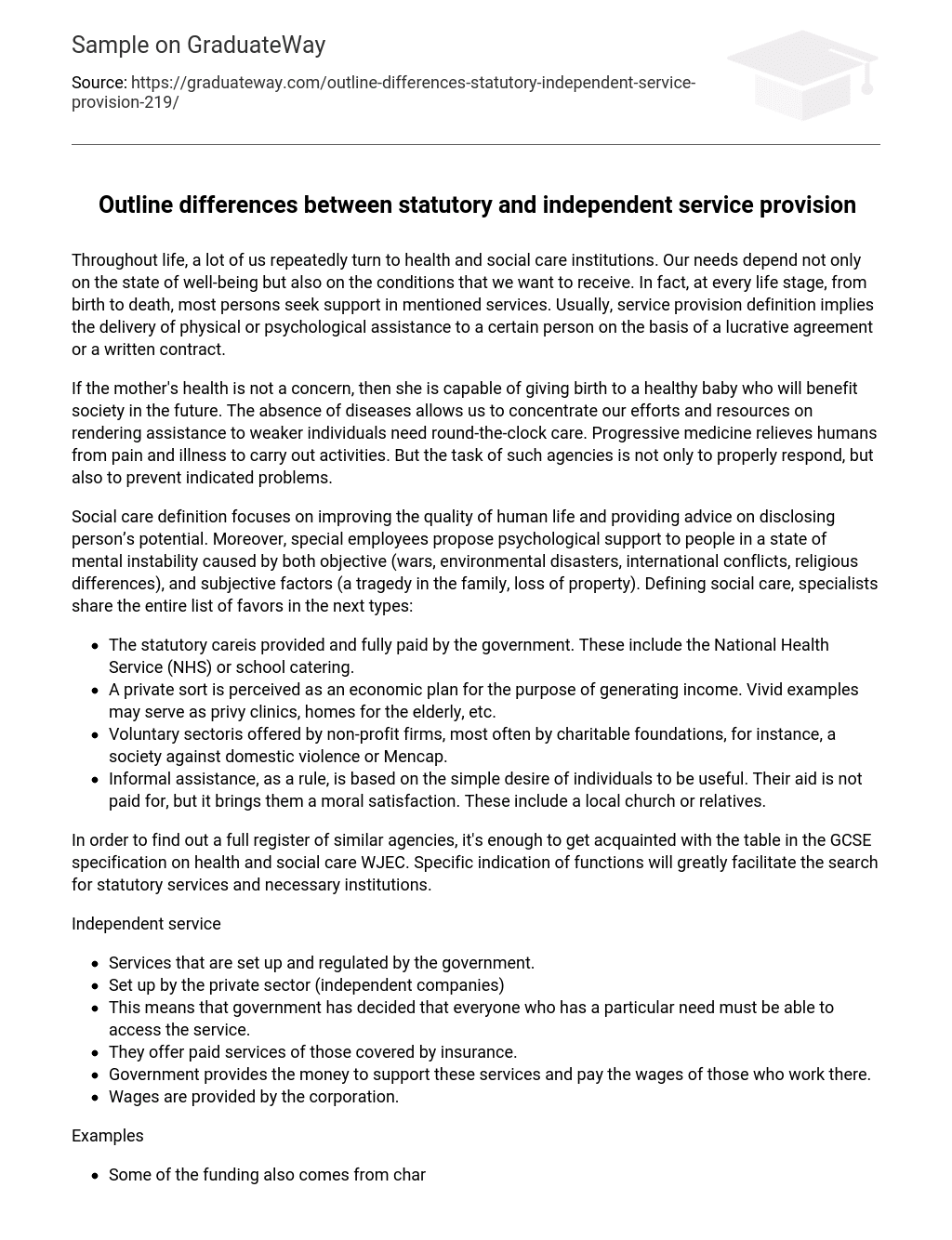Throughout life, a lot of us repeatedly turn to health and social care institutions. Our needs depend not only on the state of well-being but also on the conditions that we want to receive. In fact, at every life stage, from birth to death, most persons seek support in mentioned services. Usually, service provision definition implies the delivery of physical or psychological assistance to a certain person on the basis of a lucrative agreement or a written contract.
If the mother’s health is not a concern, then she is capable of giving birth to a healthy baby who will benefit society in the future. The absence of diseases allows us to concentrate our efforts and resources on rendering assistance to weaker individuals need round-the-clock care. Progressive medicine relieves humans from pain and illness to carry out activities. But the task of such agencies is not only to properly respond, but also to prevent indicated problems.
Social care definition focuses on improving the quality of human life and providing advice on disclosing person’s potential. Moreover, special employees propose psychological support to people in a state of mental instability caused by both objective (wars, environmental disasters, international conflicts, religious differences), and subjective factors (a tragedy in the family, loss of property). Defining social care, specialists share the entire list of favors in the next types:
- The statutory careis provided and fully paid by the government. These include the National Health Service (NHS) or school catering.
- A private sort is perceived as an economic plan for the purpose of generating income. Vivid examples may serve as privy clinics, homes for the elderly, etc.
- Voluntary sectoris offered by non-profit firms, most often by charitable foundations, for instance, a society against domestic violence or Mencap.
- Informal assistance, as a rule, is based on the simple desire of individuals to be useful. Their aid is not paid for, but it brings them a moral satisfaction. These include a local church or relatives.
In order to find out a full register of similar agencies, it’s enough to get acquainted with the table in the GCSE specification on health and social care WJEC. Specific indication of functions will greatly facilitate the search for statutory services and necessary institutions.
Independent service
- Services that are set up and regulated by the government.
- Set up by the private sector (independent companies)
- This means that government has decided that everyone who has a particular need must be able to access the service.
- They offer paid services of those covered by insurance.
- Government provides the money to support these services and pay the wages of those who work there.
- Wages are provided by the corporation.
Examples
- Some of the funding also comes from charges made to service users e.g. prescription charges, dental and optician fees.
- Support which is founded through fee payment through an insurance company.
- Some statutory care facilities such hospital and hospices are supported by volunteers.
- Some independent services also have offers for volunteers.
- Mental health trust
- Private hosptal, dentist, optician, Child-minder, Nurseries, crèche, Breakfast club, after school club
- Social services
- Private medical and nursing homes
- The national health service
- Private residential care
Outline how informal care contributes to service provision. Informal care is care provided by family members, friends and neighbours. There are approximately 7 million carers in the UK. Informal care play an important role in care and they often go unnoticed.
Roles:
- They help the person wash, bath or shower.
- They help with toileting, dress. They give out medication.
- They prepare meals.
- Baby-sitting.
Care providers:
- A large number also provide company and keep an eye on the elderly.
- Older generation provide a lot of care compared to other groups. They provide over 20 hours of care a week.
- Women also tend to provide more care than men.
Examples of informal care:
- A child may be caring for a chronically ill parent.
- A parent may be for a child with physical and mental disabilities.
- Neighbour helping with daily living activities, cooking, cleaning, and laundry.
Benefits:
- Informal cares have a beneficial input into social care.
- Informal care saves the NHS money.
- They save millions, which could have gone to provide professional/formal care.
- They subsidise formal care to a large extent.
- They work in partnership with formal carers.
Statutory services
- Community based services for adults, children and young people
- Domiciliary services for adults, children and young people
- Residential services for adults, children and young people
- Day services for adults.
- Early year
- Children’s care learning and development
- Supported housing and supported employing
- Self-directed support
- Acute hospital services
- Community hospitals
- General practitioner services
- Pharmacy in hospital and community
- Substance misuse services
- Complementary health care
Independent services
- Voluntary, not for profit or third sector
- Private provision
- Informal- family, friends and neighbours





